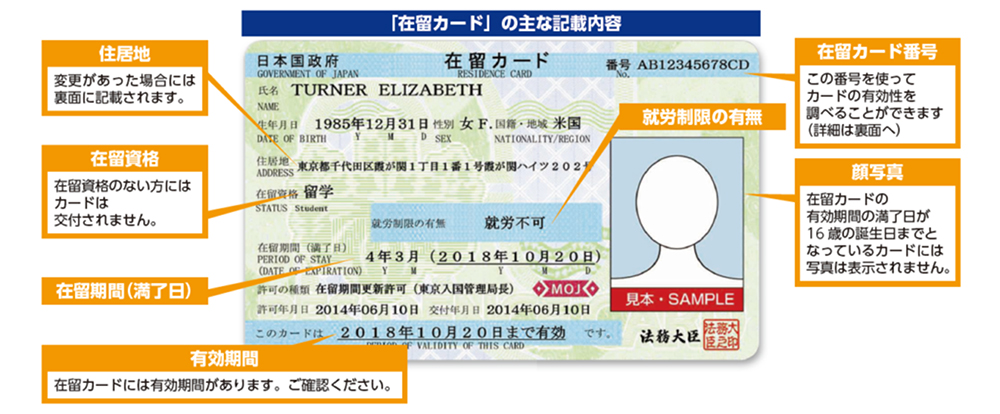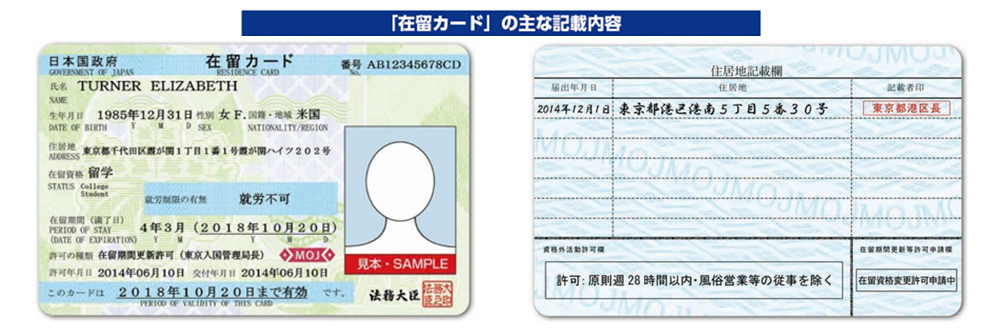Qualifications required for foreigners to work in Japan
status of residence and visas
1.About residence status

A status of residence is a qualification required for foreigners to be able to work in Japan. The type of status of residence determines the activities that can be undertaken in Japan.
2.About the Residence Card

Resident cards include information such as nationality, name, date of birth, and address. By looking at a resident card, you can see what status of residence you have in Japan, whether you are allowed to work, what kind of work you can do, and how long you can stay in Japan.The residence card is an ID card for foreign nationals living in Japan. Resident cards are issued to mid- to long-term residents (people with permission to stay in Japan for more than three months) in conjunction with permission for residence, such as landing permission, permission to change status of residence, and permission to extend the period of stay.
If you change your address, you need to declare it to the municipal office in the following 14 days. First of all, you go to the municipal office of the town where you live. You bring your resident card and submit a “moving out notification”. You will acquire a “certificate of change of address”. You can go to the municipal office of your new town of residence. You need to bring your residence card, certificate of change of address and my number certification. Then submit a moving-in form. The new address will be printed on the back of your card.
3.About Visa
A visa is a “recommendation” issued by the Japanese embassy or consulate in the foreigner's country of nationality, stating that the passport of the foreigner wishing to visit Japan is valid and that there will be no problems if they enter the country. As a result, foreigners entering Japan for purposes other than tourism must, in principle, obtain a visa before coming to Japan. Visas are valid for three months from the day after they are issued. You can apply for a visa at a Japanese embassy or consulate abroad, but you will need to check the necessary documents and application procedures on the website of the relevant Japanese embassy or consulate, or by telephone or email.
There is different visa associated with different conditions (tourism, student, professor, working). The tourism visa only allows to stay 90 days on the Japanese territory and does not allow to work. If the applicant gets a student visa, while joining courses the student can work 28 hours a week (but overtime is forbidden). The length of stay will be defined with the company or the university. Usually, it is accordingly to the length of your contract (1 year, 2 year, …).A working visa allow the applicant to work without restriction in the field defined by his vis (ex: professor one can only work in teaching field).Once the visa is accepted by the Japanese administration, it is important to take the papers from the Japanese embassy of your country. At your arrival in Japan, this paper is needed to get issued the resident card. This card will be your ID document you always have to carry with you in Japan. The front of the card include various information such as name, date of birth, sex, nationality, address, status of residence, period of stay, period of validity of this card
About Student Visas
Activities to receive education at universities, colleges of technology, high schools (including the latter stage of secondary education schools), or the upper secondary courses of special support schools, junior high schools (including the latter stage of compulsory education schools and the former stage of secondary education schools), or the junior secondary courses of special support schools, elementary schools (including the former stage of compulsory education schools), or the elementary courses of special support schools, special training colleges, miscellaneous schools, or institutions that are equivalent to these in terms of facilities and organization. Examples include students and pupils at universities, junior colleges, technical colleges, high schools, junior high schools and elementary schools. Period of Stay: Period individually specified by the Minister of Justice (not exceeding 4 years and 3 months)
Person with a student visa is authorized to work 28 hours a week (overtime is forbidden)(1).If any reasons the residence card is stolen, broken, damaged or lost the card holder must apply in the following days to the immigration centre of his residence area(2).The visa can be renewed 3 months before its expiration. It is recommended to start the process as early as possible. You bring all the papers needed to the immigration office. After the examination of all the documents. The immigration office will ask you to fill up a post card. This postcard will be sent to you to notify you if your visa is renewed or not. Consider that the answer may take 3 weeks.(3) During your stay in Japan, you can come to your country for some days. At the airport, before the passport control you need to fill up the following form. In this form, you declare when you will come back in Japan. The arrival part of the form will be attached with your passport. Be careful to not lost it.
Work visas
Status of Residence “Medical Practitioner”: This is a visa required for working as a doctor in Japan after passing the Japanese National Medical Practitioners Qualifying Examination. Activities related to medical care that are to be performed by doctors, dentists and other legally qualified persons. Examples include doctors, dentists and nurses. Period of Stay: 5 years, 3 years, 1 year or 3 months

